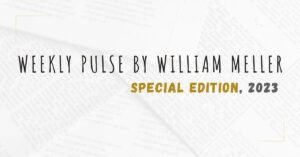The Weekly Pulse is my content curation and my highlights from readings, books, podcasts, insights, and everything I discovered during the week.
So, let’s go with some discoveries from the week!
#1 – 3 Techniques to Optimize Reading Comprehension and Retention
#2 – The Key to Career Progress
#3 – Noise: Hidden Cost of Inconsistent Decision-Making
3 Simple Techniques to Optimize Your Reading Comprehension and Retention
Source: Josh Kaufman Website
Author: Josh Kaufman
Summary: I think many Weekly Pulse readers struggle with reading comprehension and retention, but there are three simple techniques to improve these skills. The first technique involves setting a purpose for reading by asking why and for what reason you’re reading a particular piece of material. The second technique is to create a mind map of major concepts to capture key thoughts and connections between ideas. The third technique is to use the McDowell Grid, which captures key points and personal reactions side-by-side, making it easy to quickly revisit a summary of the text and remember your thoughts about the key points at the same time.
3 Highlights:
“… First, asking why you’re choosing to read a particular piece of material helps determine your purpose: what you ultimately want to accomplish by spending your time reading. Setting your purpose is the best way to factor in the opportunity cost of your time and attention… if you don’t believe what you’re about to read will be useful, you can choose to do something different…”
“… Second, asking why you might need this information primes your brain to make connections between what you’re reading and what you want to achieve. Our minds work primarily via pattern recognition – by reminding yourself of your areas of responsibility before you read, you’ll make many more connections than you would otherwise. (Be sure to keep a notebook and pen close at hand to capture your thoughts and ideas without breaking the flow of your reading...”
“… The grid is simple: using any word processing software you like, make a table with two columns. In the first column, capture a summary of a key concept or idea from the text. In the second column, record your personal reactions, ideas, and plans to put the concept into practice. When you’re finished with the book, you’ll have a archive-ready summary and action plan ready for use…”
Access full Weekly Pulse reading here >>
The Key to Career Progress
Source: Scott Young Website
Author: Scott Young
Summary: The article highlights the importance of career capital over passion in building successful careers. Career capital refers to valuable skills, credentials, reputation, contacts, and assets that individuals bring to the table for clients, customers, and employers, which increase their bargaining power. The article focuses on valuable skills as the primary ingredient in a successful career, as they are easier to bootstrap than other options like powerful friends. To build valuable skills, individuals need to identify which skills are useful and create structured opportunities to get good at them, using deliberate practice sessions combined with feedback.
3 Highlights:
“… As Cal Newport argues in his book, So Good They Can’t Ignore You, the innate passions people seldom lead to viable or compelling careers. You might have a passion for collecting stamps, but pursuing it full-time is hardly a reasonable career path. A better way to think about this question is in terms of career capital. Career capital is what you bring to the table for your clients, customers and employers. If you have something valuable to offer, you have more options for bargaining for something good in return…”
“… The importance of career capital holds true across professions. The programmer who is more productive can better negotiate promotions, vacation time or which projects they work on. The accountant with specialized expertise can bill more and take fewer clients. The designer with a popular portfolio can choose which projects to take on…”
“… There are different kinds of career capital: Credentials Reputation Contacts and friends Assets Skills In Top Performer, Cal Newport and I focus on rare and valuable skills as the primary ingredient in a successful career. This isn’t because having a good network, resume or assets is unimportant, but simply because those things tend to come more easily when you build on a base of valuable skills…”
Access full Weekly Pulse reading here >>
Noise: How to Overcome the High, Hidden Cost of Inconsistent Decision-Making
Source: Harvard Business Review
Author: Daniel Kahneman, Andrew M. Rosenfield, Linnea Gandhi, and Tom Blaser
Summary: Algorithmic judgment is more efficient than the human variety. Organizations expect to see consistency in the decisions of their employees, but humans are unreliable. Judgments can vary a great deal from one individual to the next, even when people are in the same role and supposedly following the same guidelines. And irrelevant factors, such as mood and the weather, can change one person’s decisions from occasion to occasion. This chance variability of decisions is called noise, and it is surprisingly costly to companies, which are usually completely unaware of it.
3 Highlights:
“… Bias and noise are distinct kinds of error. Each comes in different variants and requires different corrective actions…”
“… The expectation that others will agree with you is sometimes justified, particularly where judgments are so skilled that they are intuitive. High-level chess and driving are standard examples of tasks that have been practised to near perfection. Master players who look at a situation on a chessboard will all have very similar assessments of the state of the game—whether, say, the white queen is in danger or black’s king-side defence is weak. The same is true of drivers. Negotiating traffic would be impossibly dangerous if we could not assume that the surrounding drivers share our understanding of priorities at intersections and roundabouts. There is little or no noise at high levels of skill...”
“… Studies show that algorithms do better than humans in the role of decision maker…”
Access full Weekly Pulse reading here >>
Do you want to get new content in your Email?
I am incredibly grateful that you have taken the time to read this Weekly Pulse.
The Weekly Pulse is an important section of this website, aiming to share good stuff with you every week!
Do you want to explore more? Check more Weekly Pulse content here.
Check my main categories of content below:
- Agile
- Blog
- Book Notes
- Career
- Leadership
- Management
- Managing Yourself
- Productivity
- Project Management
- Technology
- Weekly Pulse
Navigate between the many topics covered in this website:
Agile Art Artificial Intelligence Blockchain Books Business Business Tales Career Coaching Communication Creativity Culture Cybersecurity Design DevOps Economy Emotional Intelligence Feedback Flow Focus Gaming Goals GPT Habits Health History Innovation Kanban Leadership Lean Life Managament Management Mentorship Metaverse Metrics Mindset Minimalism Motivation Negotiation Networking Neuroscience NFT Ownership Parenting Planning PMBOK PMI Politics Productivity Products Project Management Projects Pulse Readings Routines Scrum Self-Improvement Self-Management Sleep Startups Strategy Team Building Technology Time Management Volunteering Work
Do you want to check previous Weekly Pulse posts? Check the last couple of weeks:
- Weekly Pulse by William Meller | Special Edition, 2023
- Weekly Pulse by William Meller | Week 51, 2023
- Weekly Pulse by William Meller | Week 50, 2023
- Weekly Pulse by William Meller | Week 49, 2023
- Weekly Pulse by William Meller | Week 48, 2023
Support my work by sharing my content with your network using the sharing buttons below.
Want to show your support tangibly? A virtual coffee is a small but nice way to show your appreciation and give me the extra energy to keep crafting valuable content! Pay me a coffee:





